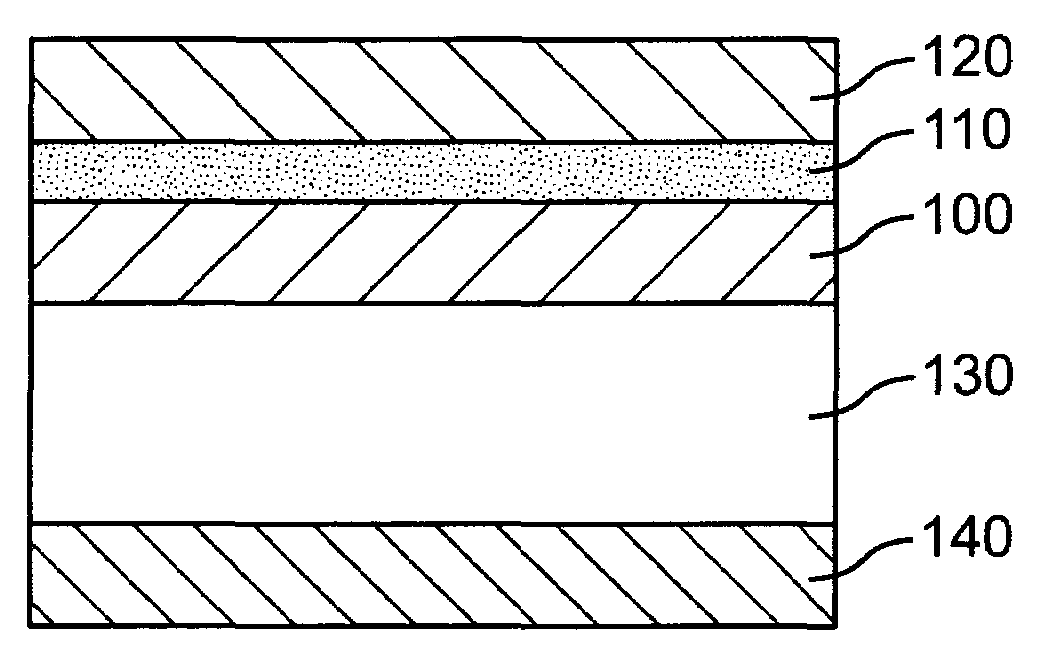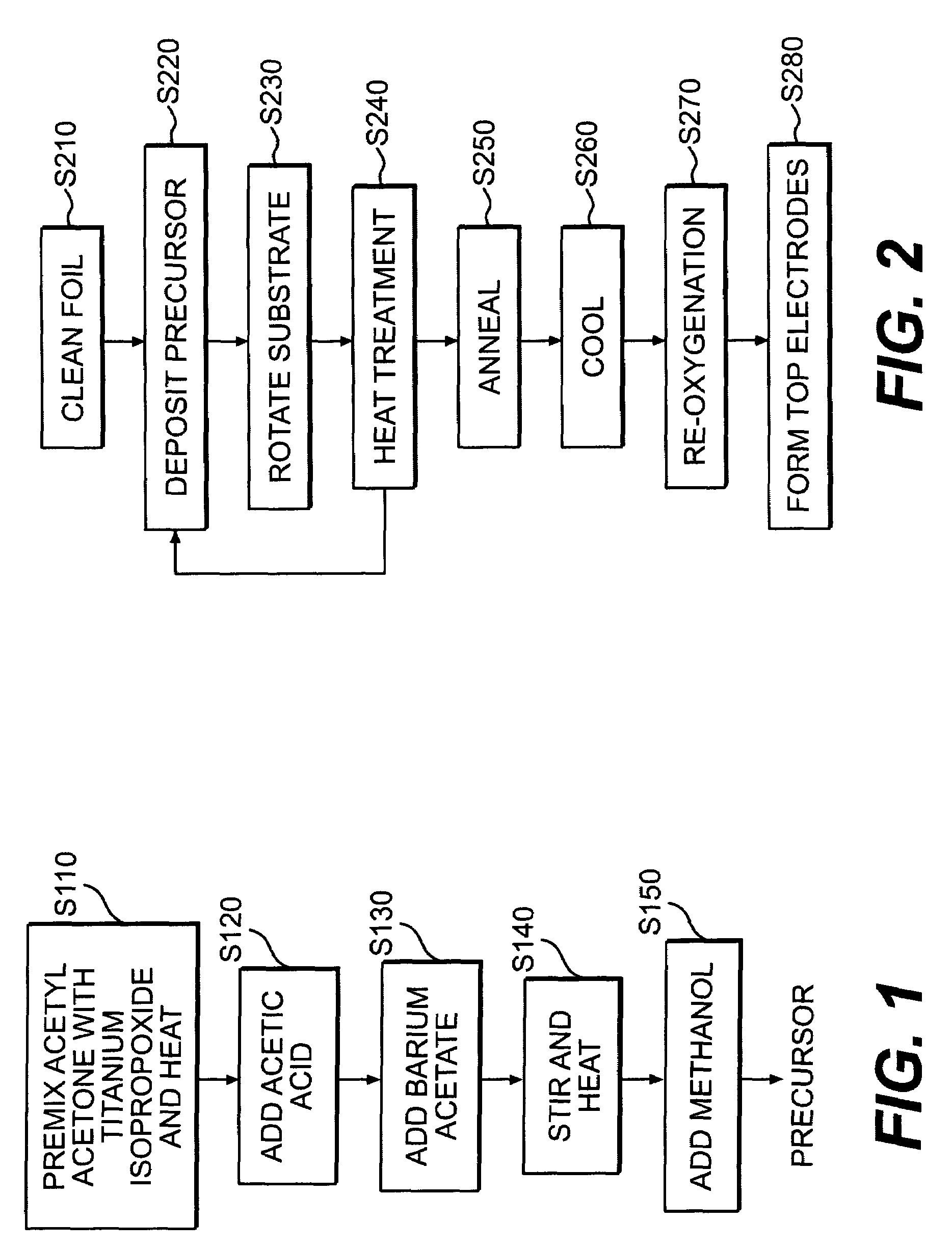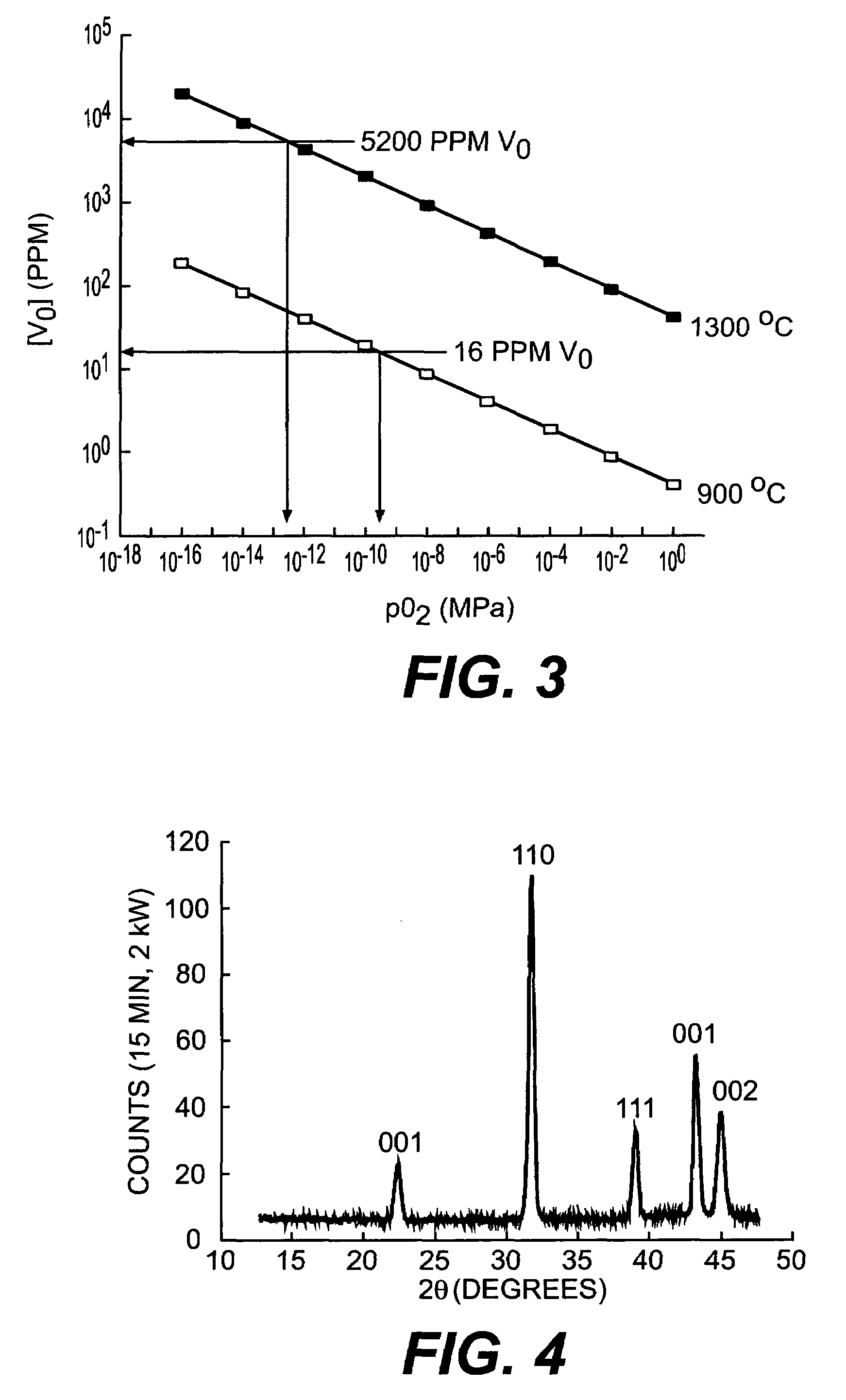Thin film dielectrics for capacitors and methods of making thereof
a thin film dielectric and capacitor technology, applied in the field of embedded capacitors, can solve the problems of low oxygen partial pressure, base metal foil oxidation, and inability to fully crystallize the dielectric to the preferred crystallographic form, and achieve the effect of low loss tangents and high capacitance densities
- Summary
- Abstract
- Description
- Claims
- Application Information
AI Technical Summary
Benefits of technology
Problems solved by technology
Method used
Image
Examples
example 1
[0063]Barium Titanate (BaTiO3) Dielectric Produced Directly on Copper Foil
[0064]A fired-on-foil thin film undoped BaTiO3 dielectric was formed from the following precursor solution:
[0065]
Barium acetate2.6gTitanium isopropoxide2.9mlAcetylacetone2.0mlAcetic acid10.0mlMethanol15ml
[0066]The precursor solution was prepared and deposited on a clean 0.5 oz. copper foil as described with reference to FIGS. 1 and 2. No dopants were added to the precursor solution. Annealing was performed at 900° C. for 30 minutes in an atmosphere containing a partial pressure of oxygen of 10−10 atmospheres. The annealed thickness of the resultant dielectric was approximately 0.5 micron. Re-oxygenation was performed at 600° C. for 20 minutes in an atmosphere containing a partial pressure of oxygen of 10−7 atmospheres. A top platinum (Pt) electrode was sputtered onto the dielectric.
[0067]FIGS. 4–7 show experimental data collected for the undoped BaTiO3 capacitor prepared on copper foil according to Example 1. ...
example 2
Yttria-Doped Barium Titanate Dielectric
[0077]FIG. 9 is a plot of measured permittivity (upper data set) and loss tangent (lower data set) versus bias voltage for a thin film Y-doped BaTiO3 capacitor prepared on a copper foil substrate. Data was collected during the voltage ramp up and during the ramp down. The overlapping curves illustrate the expected hysteresis behavior. A high permittivity value of approximately 1600 was achieved with yttrium doping.
[0078]The dielectric was prepared by adding 1 mol % Y to the precursor solution as described in Example 1. The precursor was then solution-deposited to form a dielectric layer. Annealing and re-oxygenation of the dielectric layer was performed as in Example 1. The resultant dielectric composition is described generically as: (Ba1-xYx)(Ti1-yYy)O3 where 0<x<1 and 0<y<1. The specific precursor solution composition was:
[0079]
Barium acetate2.6gYttrium acetate0.27gTitanium isopropoxide2.9mlAcetylacetone2.0mlAcetic acid10.0mlMethanol15ml
[008...
example 3
Barium Titanate Dielectric Prepared on Platinum Foil
[0081]In Example 3, a thin film BaTiO3 dielectric film was prepared on a platinum foil substrate, rather than a copper foil. The BaTiO3 dielectric was formed in a manner similar to that of Example 1. The x-ray line widths, from which grain size is calculable, were identical for the dielectric formed on platinum as for the BaTiO3 dielectric formed on copper foil. Accordingly, the x-ray line widths indicate average dielectric grain sizes in the range of 0.1–0.2 micron, and high crystallinity. Choice of foil material therefore appeared to have little or no effect on grain size.
PUM
| Property | Measurement | Unit |
|---|---|---|
| temperature | aaaaa | aaaaa |
| partial pressure | aaaaa | aaaaa |
| temperature | aaaaa | aaaaa |
Abstract
Description
Claims
Application Information
 Login to View More
Login to View More - R&D
- Intellectual Property
- Life Sciences
- Materials
- Tech Scout
- Unparalleled Data Quality
- Higher Quality Content
- 60% Fewer Hallucinations
Browse by: Latest US Patents, China's latest patents, Technical Efficacy Thesaurus, Application Domain, Technology Topic, Popular Technical Reports.
© 2025 PatSnap. All rights reserved.Legal|Privacy policy|Modern Slavery Act Transparency Statement|Sitemap|About US| Contact US: help@patsnap.com



